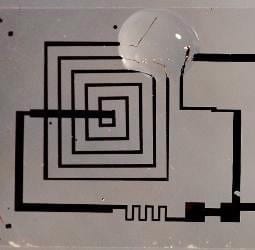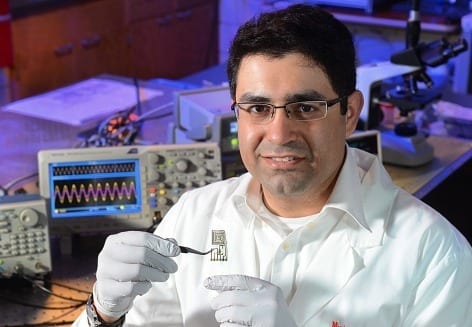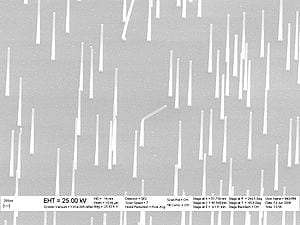
Scientists today described key advances toward practical uses of a new genre of tiny, biocompatible electronic devices that could be implanted into the body to relieve pain or battle infection for a specific period of time, and then dissolve harmlessly.
These “transient electronics,” described here at the 245th National Meeting & Exposition of the American Chemical Society (ACS), the world’s largest scientific society, could have other uses, including consumer electronics products with a pre-engineered service life. The meeting, which features almost 12,000 reports on new scientific advances and other presentations, continues through Thursday.
John Rogers, Ph.D., who led the research, explained that it arises from a view of electronics fundamentally different from the mindset that has prevailed since the era of electronic “chips,” integrated circuits and microprocessors, which dawned almost 50 years ago.
“The goal of the electronics industry has always been to build durable devices that last forever with stable performance,” Rogers explained. “But many new opportunities open up once you start thinking about electronics that could disappear in a controlled and programmable way.”
Those opportunities, he added, include cell phones and other mobile devices that stop working on a timetable corresponding to the time for upgrading to a new model. Instead of adding to the $50 million of so-called e-waste generated every year, the devices would simply break down. Medical implants that are only needed for a few weeks could just disappear, without requiring an extra surgery to remove them from the body. And no one would have to retrieve dozens of transient water-quality sensors from a river undergoing water quality monitoring. They would dissolve without a trace and without harm to the environment.
Although other researchers have developed so-called bioresorbable medical devices that disappear over time in the body, Rogers’ team at the University of Illinois at Urbana-Champaign is the first to produce such broadly applicable technology, which has many more potential uses than other devices. The scientists have designed transient electronics as temperature sensors, solar cells and miniature digital cameras, for instance. Moreover, previous bioresorbable devices were made of different materials that only partially dissolved, leaving behind residues, and they did not perform as well as Rogers’ current devices.
The electronics are enclosed in material that dissolves completely after a certain period of time when exposed to water or body fluids, somewhat like dissolvable sutures. By altering the number of layers of the wrapping, scientists can define everything about how the device will dissolve in the body or in the environment, including its overall lifetime, said Rogers. The devices perform just as well as conventional electronics and function normally until the encapsulating layer disappears. Once that happens, it takes about 30 minutes for the electronic connections to dissolve away, and the device stops working. Current versions of the devices remain operable for a few weeks. Rogers’ team is researching ways to make devices that last a few years.
The Latest Bing News on:
Transient electronics
- Transient Visual Disturbanceson April 28, 2024 at 5:00 pm
Taking the History of the Patient With Transient Visual Loss As with most diagnoses in medicine and particularly in the field of neuro-ophthalmology, the ability to elicit a focused history from ...
- Transient charged in attempted kidnapping of child at Walnut Creek Libraryon April 26, 2024 at 7:08 am
WALNUT CREEK — A 27-year-old transient has been charged with sex crimes following an attempted kidnapping at the downtown library earlier this month, authorities said. Police arrested the man on ...
- Crime and Public Safetyon April 26, 2024 at 3:36 am
WALNUT CREEK — A 27-year-old transient has been charged with sex crimes following an attempted kidnapping at the downtown library earlier this month, authorities said. Police arrested the man on ...
- Transient Visual Disturbanceson April 25, 2024 at 5:00 pm
When an ophthalmologist assesses a patient with a history of a transient change in vision, the diagnosis of amaurosis fugax is the one most commonly considered. Amaurosis fugax is defined as a ...
- Santa Barbara Reports Transient Occupancy Tax Results for Marchon April 25, 2024 at 3:02 am
Year to date, total TOT revenues are coming in 4.2% below budget. The TOT is a tax on “transient” guests staying in any hotel, inn, motel, or other commercial lodging establishment for a ...
- Transient was once banned from L.A. Metro for violence. Now he’s charged with killing woman on subwayon April 24, 2024 at 4:07 pm
Calling the fatal stabbing of a woman riding a Metro train “truly a tragedy that should have never occurred,” Los Angeles County Dist. Atty. George Gascón on Wednesday announced a murder ...
- Transient was once banned from L.A. Metro for violence. Now he's charged with killing woman on subwayon April 24, 2024 at 3:07 pm
Calling the fatal stabbing of a woman riding a Metro train "truly a tragedy that should have never occurred," Los Angeles County Dist. Atty. George Gascón on Wednesday announced a murder charge ...
- Did The Fed's Strategy Pay Off? Goldman Sachs Projects Steady Inflation Decline In 2024on April 23, 2024 at 1:04 pm
Disinflationary forecasts have fallen out of favor recently, especially following three consecutive months of unexpected inflation increases. Yet, Goldman Sachs economist Jessica Rindels has made a ...
- Transient ex-con arrested in Anaheim dog kicking caseon April 20, 2024 at 2:25 am
A 34-year-old transient with a criminal record has been booked on suspicion of kicking a small dog, as seen on video, and police are asking for the public’s help in finding the dog. Joseph ...
- Transient man accused of slitting friend's throat open found incompetent to stand trialon April 8, 2024 at 9:52 am
Four months after counsel for a transient man facing charges after authorities said he slit his friend's throat in Ave Maria questioned the man's competency to stand trial, the judge presiding ...
The Latest Google Headlines on:
Transient electronics
[google_news title=”” keyword=”transient electronics” num_posts=”10″ blurb_length=”0″ show_thumb=”left”] [/vc_column_text]The Latest Bing News on:
Transient devices
- Transient charged in attempted kidnapping of child at Walnut Creek Libraryon April 26, 2024 at 7:08 am
WALNUT CREEK — A 27-year-old transient has been charged with sex crimes following an attempted kidnapping at the downtown library earlier this month, authorities said. Police arrested the man on ...
- Crime and Public Safetyon April 26, 2024 at 3:36 am
WALNUT CREEK — A 27-year-old transient has been charged with sex crimes following an attempted kidnapping at the downtown library earlier this month, authorities said. Police arrested the man on ...
- Transient Elastography Devices Market Maximizing the Value of Focus Groups Strategies for Effective Qualitative Researchon April 25, 2024 at 8:11 pm
The latest research report from Report Ocean titled “Transient Elastography Devices Market: Trends Analysis from 2024 to 2032”. This report delivers accurate economic projections, worldwide ...
- Boston Scientific warns on some Vercise Genus implantable pulse generatorson April 25, 2024 at 2:22 pm
Boston Scientific recently issued an urgent field safety notice for certain Vercise Genus DBS implantable pulse generators.
- FTC issues refunds of over $5M to Ring customers; are you eligible?FTC issues refunds of over $5M to Ring customers; are you eligible?on April 25, 2024 at 2:12 pm
The FTC will refund Ring customers following a 2023 settlement that allowed employees and contractors to access cameras.
- Transient was once banned from L.A. Metro for violence. Now he’s charged with killing woman on subwayon April 24, 2024 at 4:07 pm
Calling the fatal stabbing of a woman riding a Metro train “truly a tragedy that should have never occurred,” Los Angeles County Dist. Atty. George Gascón on Wednesday announced a murder ...
- Vishay (VSH) Unveils Voltage Suppressors, Expands Portfolioon April 15, 2024 at 8:19 am
Vishay Intertechnology, Inc. VSH is leaving no stone unturned to expand its discrete offerings in a bid to bolster its presence in the semiconductor industry.The unveiling of four series of ...
The Latest Google Headlines on:
Transient devices
[google_news title=”” keyword=”transient devices” num_posts=”10″ blurb_length=”0″ show_thumb=”left”]










